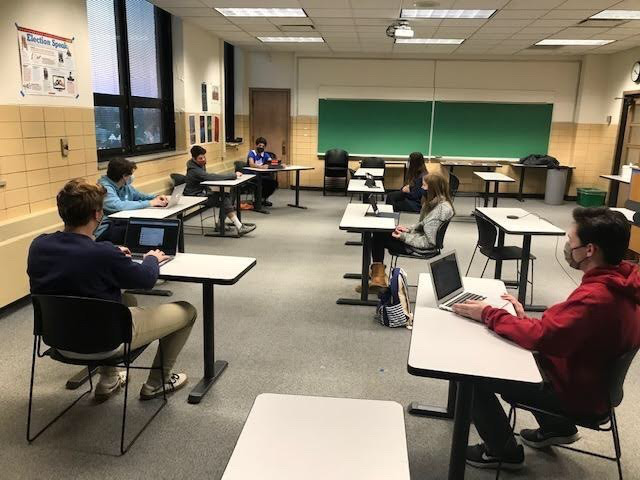COVID and clubs: How our clubs have changed
Clubs are well underway with the process of reshaping their structures to fit the current circumstances
Shakespeare Club, like many others, has adapted to the pandemic by doing things differently this year.
“I think Shakespeare Club is really connected with the outside community this year,” said sponsor Wendy Parks. “We’ve seen and put on video-recorded plays where we read lines at high-caliber places like the Chicago Shakespeare Theater with 40 other schools. The big difference for the club this year is that it’s more collaborative now, as opposed to when we were competing with other schools for who can put on the best shows.”
When the school went to all online learning in late March of 2020, several extracurricular activities were either shelved, or struggled to produce a viable response to the crisis when it hit so suddenly. This year, however, a lot of student organizations have restructured their club orientation to better coincide with the new circumstances, and it has taught valuable skills to the heads and sponsors.
The shift to remote learning has been a tremendous change for both club heads and sponsors, but both have found ways to circumnavigate the chaos.
“The way we operated before was by putting together a presentation of the fundamentals of the topic we’ll be discussing in that meeting, and we can still do that with Zoom,” said senior Max Russo, the head of New Trier Non-Partisans, a political discussion forum that assimilates opinions from all sides of the spectrum.
“When it comes to whether or not our club was really shaken to its core by quarantine, I would say that it hasn’t,” Russo says. “Even though my recruitment methods have changed, the discussion-oriented nature of the club has more or less remained the same.”
Other discussion-based clubs such as Model UN have put new and complex systems in place that allow the club to thrive both in person and online.
The current chairman of the team is senior Max Leibov, who primarily focuses on community building through new supplement methods to accommodate Zooms.
“I think for this year, I have to plan a lot more meticulously for Model UN,” said Leibov. “It’s not just planning club topics and preparing for virtual tournaments, but it also encapsulates things like staying safe while giving [the students] time to research their topics and make placards for themselves while maintaining social distancing. We’ve made heavy use of Zoom breakout rooms and screen-sharing to practice to the best of our ability and prepare for several conferences.”
English teacher and the sponsor for Model UN Brent Strom said the shift to an online club atmosphere has been a learning experience.
“In one word, this whole pandemic has been awful,” Strom said. “However, it still taught us valuable lessons about key tenets like leadership and adaptation to adverse situations.”
Though every club is different, many have had varying responses to the shake-up, especially ones that weren’t as discussion-oriented as those kinds of clubs.
One such club is New Trier’s Sci-Fi Club, led by senior Emma Ruemmler.
“I’d say we have to improvise more over these trying times, because our club is much more activity-oriented than conversation-oriented,” Ruemmler said. “The thing I’m most grateful for is the fact that there are still some activities to engage people in over Zoom, like Pictionary or Jeopardy.”
Whether it’s a club that relies on discussions, Kahoots, or Google Slides presentations, clubs are continuing to change and grow in the era of COVID-19, and it’s all thanks to strong club leadership.
“Not only have our students been able to attend plenty of online conferences and win honorable mentions, but we’re also planning to attend an international virtual conference second semester,” Strom said. “All this wouldn’t have been possible without strong leadership and careful planning.”









































